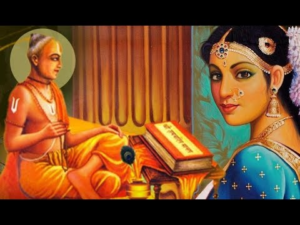ntroduction to Manu’s Story:
There is a story of Manu, a young devotee of Krishna. Manu was on a pilgrimage for many days and was walking towards the holy town of Vrindavan.
Encounter with Scholars:
On reaching the other side of the river, he heard raised voices. As he went closer, he saw a group of scholars arguing about where we have all come from in the beginning of time. Each one was trying to prove that he knew best by using big words and quoting from the scriptures.
The Incident with the Crow and the Fruit:
Suddenly, a shrieking crow flew from one of the palm trees under which the men were standing. At the same time, a large tal fruit fell on the ground before them. The scholars were startled. One explained, “What a coincidence, the bird flies from a tree and a fruit drops at exactly the same time. It is amazing how randomly chance works.”
Arguments Among the Scholars:
Another scholar started arguing, “Everything works as a result of something else. Nothing works by chance. The tal fruit obviously fell to the ground because the crow tried to land on it.” The third scholar scoffed at them, saying, “That is just pure guesswork. Gravity made the fruit fall. As a result, the bird flew away.” Each thought he knew best.
Manu’s Wisdom:
Quite amused by their exchanges, young Manu stepped forward and said, “I have been listening to your arguments. It is surprising that such learned men are unable to come to an agreement over such a simple matter. If you allow me, I can settle this matter for you very easily.”
Divine Will Explained:
Then he said, “Do you all agree that not a blade of grass moves without the mercy of the Lord?” All the scholars nodded their heads in agreement. “The bird flew and the fruit fell down both by the will of the Lord.”
Offering to the Lord:
Then Manu dipped the fruit in the river and washed it. He said to the scholars, “The all-powerful Lord accepts fruit, water, flower, and even leaves when they are offered with love and devotion.” He then broke open the fruit and offered it to the Lord with prayers. Distributing the prasad among the scholars, he said, “It is more sensible to do something more positive in the present than to argue about the past.”
Scholars’ Realization:
The scholars agreed at once and one of them said, “As long as one knows the purpose of our lives, how does it matter where we come from? We should not argue over trivial matters. Our only duty is to serve the Lord with love and devotion.”
Moral of the Story
Focus on Krishna: Manu, by his example, has shown us that the purpose of our life is to remember the glories of Krishna and not to waste our valuable time over useless speculations. We must always meditate on the Supreme Personality of Godhead by constantly thinking of Him (anu cintayan) while diligently carrying out our prescribed duties.
Relishing Krishna’s Association: Constant thinking is possible only when we relish the taste of the nectarian sweetness of His association in the form of sadhana (chanting, reading, writing, etc.) and service (cooking, cleaning, and so on). Krishna is our life force, and Krishna should be the center of all our activities.
Scriptural Guidance: In Bhagavad Gita 8.8, Lord Sri Krishna says:
abhyaasa-yoga-yuktena cetasaa naanya-gaaminaa
paramam purusham divyam yaati paarthaaanucintayan
“He who meditates on Me as the Supreme Personality of Godhead, his mind constantly engaged in remembering Me, undeviated from the path, he, O’ Partha, is sure to reach Me.”
Practice and Goal: In this verse, Lord Krishna tells us about the purpose of our life, i.e., the process and the goal to be reached. Lord Krishna stresses the importance of remembering Him and explains how to do that. The word “abhyaasa yoga” is very significant in this verse. This Bhakti yoga is not just a mental speculative process; rather, it is a process full of activities, engaging our body, mind, and intelligence in the service of the Lord round the clock.
Practice Makes Perfect: The word ‘abhyasa’ means practice. That is why Srila Prabhupada and all elevated acaryas constantly hammer us with the instruction – “Put into Practice”. In his purport, Srila Prabhupada states that the mind is fickle, and therefore it is necessary to engage the mind by force to think of Krishna.
Transformative Power of Remembrance: One example often given is that of the caterpillar that thinks of becoming a butterfly and so is transformed into a butterfly in the same life. Similarly, if we constantly think of Krishna, it is certain that at the end of our lives we shall have the same bodily constitution as Krishna.
By understanding and implementing these lessons, we can ensure that our lives are purposeful and directed towards the ultimate goal of achieving Krishna’s divine association.



